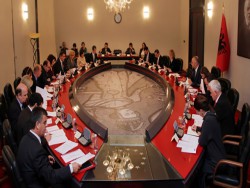Albania’s News Correction Site’ Concerns Experts
The Albanian government launches news website to ‘correct false media reports’, but analysts recommend focusing on transparency instead.
The Albania Government has created its own website to correct what it describes as false or biased news reports published by online news portals or disseminated by the opposition Democratic Party. The move has caused some concern among media analysts, who believe the government should focus on transparent governance overall, and not just selectively respond to allegations, with some concerned the site could become a propaganda tool. In addition, experts believe the press and broadcasters should be allowed to get on with the job of reporting the news and ensuring government accountability to the public.
The Albanian-language website –transparenca.al– was officially launched last Thursday via a video message from the government’s director of communications, Endri Fuga. Fuga described the site as an “anti-defamation” initiative that would enhance transparency and allow the government to respond to allegations of government-level corruption. “This initiative came [about] for giving responses to the ongoing allegations coming from the Democratic Party, but also to some portals which are offering the public false or distorted information,” Fuga said.
Two of the first four articles, tagged as ‘latest news’, give the government’s response to corruption allegations published by Albanian media outlets and others made by the opposition parties. Another item on the new government site addresses, on behalf of the Prime Minister Edi Rama, concerns raised by the Orthodox Church of Albania. Other stories provide, claims the government, “facts” in response to allegations against one of the government agencies.
Rama, in a Facebook comment posted just after the launch, said: “This portal comes as a need to directly communicate with the public without political rhetoric gloves and third party mediators, who often distort [the information].” Robert Rakipllari, Editor-in-Chief of the daily Panorama newspaper, told the Balkan Investigative Reporting Network, BIRN, that the government is right to say there has been an increase in Albanian news portals that do not publish credible information. “The problem comes because some of these portals don’t have the necessary staff to produce highly professional information [reports]. Often, they just take and interpret the news produced by the mainstream media,” he said. However, he believes that it is the role of media, not government, to hold those in power to account while ensuring transparency.
“It does not make sense that government aims to make transparency to itself,” he said. Despite this, Rakipllari says the move is good news of a sort as it shows the executive has started to react to allegations raised in the media. However, he wants to see the government give timely and transparent responses to all media outlets publishing critical stories. “It is important that the government reaction becomes a standard, not just for selected cases. Otherwise, the portal could be just an instrument of propaganda,” he said. Lutfi Dervishi, a media trainer at Albania Media Institute and analyst told BIRN the government has a lot of other steps to take in order to improve transparency. “For government, media, politics and above all citizens, it would be more valuable if the government created a website where everybody can see where public money is going,” he suggested.
He believes that if the executive will make transparency about public money less governmental correction will be needed. This is not the first time that the Albania government has launched websites it says will enhance transparency and tackle corruption. In February, the government launched the stopkorrupsionit.al site, allowing citizens to anonymously report cases of alleged bribery. Some cases were later published on the site, but the government has not yet released statistics showing how many complaints were resolved.
19 October 2015

